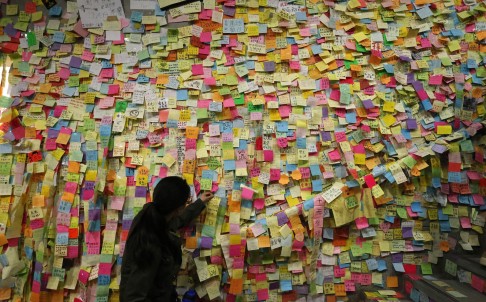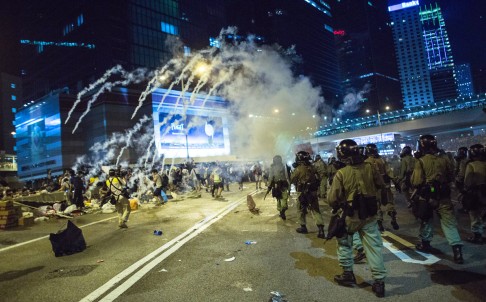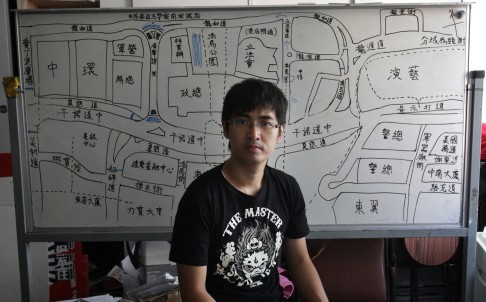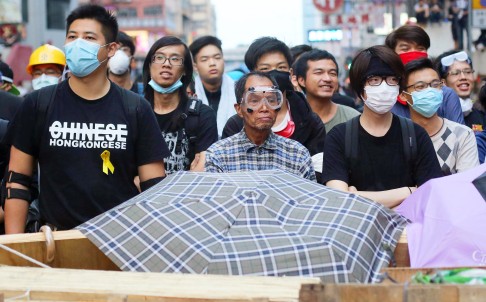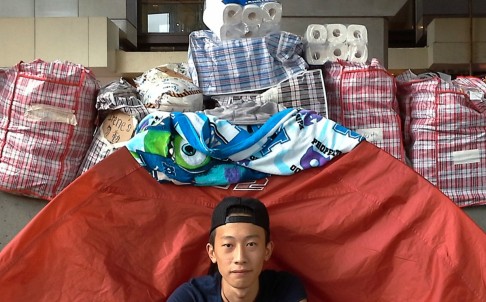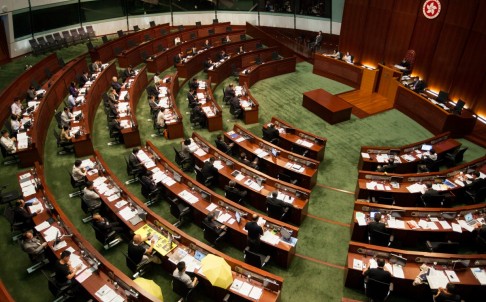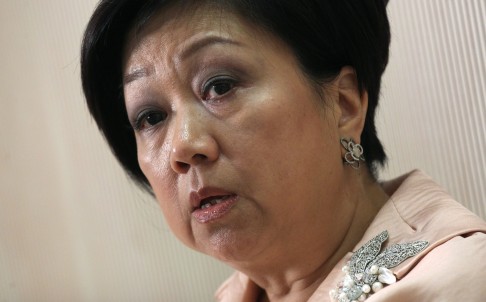二零一四年九月廿八日,我在做甚麼?
2014-10-31
二零一四年九月廿八日下午三時四十五分,我帶著在家樓下買的眼罩,一筒朱古力餅,一支剛剛買的1.5升蒸餾水,來到了金鐘地鐵站。
這時人群已經開始聚集,在海富中心A出口出來後,好不容易才擠到了干諾道中前的天橋電梯。那邊已經有過百個警察組成人鏈把守,滴水不漏,人們只可以從電梯上下來,但卻不可以上去,更別說要橫過天橋去支持在入面的學生了。
回頭看去海富中心有一個人拿著大聲公在演講,內容大概是告訴大家要有被胡椒噴霧攻擊的準備,被噴中後要如何處理,還有被捕後的權益和法律支援等等。
「我地接住落黎要做既事,後果要由我地自己承擔,有覺悟既就一齊黎啦。」
那個在演講的人說。
圍著那人的群眾齊聲怒吼,士氣高漲。雖然那時我還未知道,這將會是一場戰爭,但從那聲充滿熱血的怒吼中,我聽出這次示威和每年七一又或是反國教反高鐵有本質上的分別。
在海富中心出來後,在擠逼的人群中,沿著全副武裝的警察人鍊前進。在KFC後面,樂禮道旁邊就是熱血公民所建立的帳幕,後面有個物資站,這時都已經密密麻麻地佈滿了來聲援學生的人,大家都面向著面前的夏愨道,前面有三層由全副武裝的警察組成的人鍊。
行人路中間有個揚聲器,有一位青年人站在帳幕那邊的高台在演講。主要是教大家一定要先載好口罩及眼罩,如果沒有的話要快點到物資站領取,不時向比較後排的人報告警察的數字。他說得非常具體,例如當有衝撞時,要伸直雙手支撐前面的人,被胡椒噴霧噴中的話,不要馬上用水衝洗等等。因為他的描述,讓那實實在在的緊張氣氛正籠罩著我。
我在這裡停了下來,站在原地聽那個演講的青年還會說甚麼。他除了重覆不同的資訊外,還不時會帶領叫口號,主要的口號有:「學生無罪、釋放學生」「梁振英下台」「保護學生」「開路」等等。我當然也有跟著喊,這些正是我來這裡的原因,我們要進去政府總部支援學生,我們要警察開路。而旁邊的物資站中,則有人拿著幾瓶水、幾個口罩、幾件便利雨衣叫我們傳開去,讓有需要的人取用。
這時候,在海富中心的牆邊,有一個女生吸引了我的視線。她穿著一件淺黃色的T裇,束著一條曲髮的馬尾辮;但吸引我的不是她的外貌(但清秀可人是真的),而是她的眼神,那是一個旁觀者的眼神,是看歷史書時那種冷漠的眼神,那種眼神讓人感覺好像面前發生的事情都已經是明日黃花一樣。
我呆呆的看著她那個眼神,好像大概三十秒吧,當回過神來的時候,我發現人們已經開始向前擠壓。
當時我想如果有一個人可以衝出夏愨道,這次運動就會有希望。因為中信天橋、海富天橋、後面的演藝道都被封死了,換言之,現在沒有任何通往政府總部的道路,我們的要求不多,只是單純的想過去支援學生罷了。
我戴上眼罩和口罩,大家嚮應演講青年的呼籲把雨傘以人傳人的方式傳上前面。我用雙手伸直抵住前面的大哥,大家一起大叫「1,2,3」然後向前推進。
「舉高雙手!如果唔係佢地會屈你襲警嫁!」演講的青年說著,前排沒傘的人也跟著照做。
「急救!」「急救!」推進了四五次之後,開始有人受傷,大多是由胡椒噴霧做成的。
「後退!」「後退!」大家稍為停止前進,慢慢退後,再在人群中分出一條道路讓傷者退後。傷者按著頭部或者眼睛,有些忍不住大聲呻吟,有些則咬著牙關,痛苦不堪。
傷者退走後,我們又一次開始向前擠壓,我身處的位置離最前線大約五至六米,前面疊了十幾層人,胡椒噴霧射不到這邊來。
如是者,我們衝了幾次,一個又一個的傷者從前線退下來到急救站洗眼,一把又一把雨傘不停的再遞向前。我沒法知道前面發生了甚麼事,但我確實地知道警察已經被我們推出馬路上了。
然後我看見右邊中信天橋下的夏愨道上,有一輛城巴停了下來。前面的人有些不完整的資訊傳來,有些說右邊開了一個缺口,有些說有人已經成功衝出夏愨道,也有些說在演藝道那邊人群已經衝上了馬路。
我不知道自己應不應該繼續往前推,也完全沒法得知附近的情況。周圍的人開始慢慢的移動,再未清楚發生甚麼前,我決定先觀望一下。
慢慢地,警察後面開始聚集了人群,他們站在路肩上,雙手握拳舉高。看來他們真的找到缺口,我們把原本守住馬路的警察反包圍了。
這一刻,夏愨道事實上已經被我們佔領了。守住馬路的警察往中環的方向一個個離開,而我也在右邊地盤旁走上了夏愨道的路中心,大家懷著戰戰兢兢的心情呆站著。行動力較高的人已經跳過近政府總部的那一邊,而且一塊寫著「急救站」的紙牌連同幾個相信是急救員的人也踏出了干諾道中。
我站在中信橋的下面,並沒有跨過對面行車線。人群魚貫地走出來,警察已經全部離開,大家大踏步地步上夏愨道和干諾道中。我回個神來,向右邊望去,演藝道那邊的行車天橋已經滿滿是人,看來演藝道那邊的缺口也打開了。
大家繼續喊著:「學生無罪!保護學生!」
接著,整條干諾道中,站滿了示威者。
大家沒有停下來,繼續向前推進,我們的目標是公民廣場,我們要聲援在裡面被困的學生。我沒有跳過對面線,只是留在這邊幫手傳話和傳物資。我很膽小,這已經是我的極限了。
前線設於添美道和干諾道中的那一邊,與我相隔三條行車線,前面重覆地叫著「開路」、「保護學生」等等口號。中間我們讓出了一條闊約一米的路讓傷者可以退到急救站。後排的雨傘、支裝水和保鮮紙等等沿沿不絕的遞上來,我一邊把物資傳到前面,一邊喊口號,為前線的人們打氣。
傷者帶著慘叫和哀號往後退,懂急救的人立刻走上前扶著他們,用生理鹽水替他們清洗眼睛。其中一個傷者的臉差不多被胡椒噴霧完全覆蓋,他從對面馬路跨過來後,立刻急步的衝向急救站。
「好撚辛苦呀!救我呀!好撚辛苦!」從他的聲音我可以體會到他的痛苦,也體會到在馬路上這幾千個人的決心。大家載著眼罩、口罩走到這街道上來,為的是要聲援公民廣場內的學生,為的就是要爭取真正的普選。
要求開路的衝擊持續著,一個又一個的前線傷者不斷地退後來,偶爾會看見對面馬路有射至兩三米高的胡椒噴霧,前線對雨傘的需求越來越多。
我由不斷地把雨傘傳向前,慢慢變成了不斷地向後面的人叫:「前面要遮呀,有無遮可以比前面呀!」
當物資或者前線人手補不過來的時候,前線會稍為退後,衝擊也會停止一陣子。在後面的我其實並不清楚前面究竟發生甚麼事,但天生膽小的我實在沒法跨過對面馬路直接去面對胡椒噴霧。
我身旁有兩個大約六七十歲的老伯,他們正在用保鮮紙包裹眼睛,有些人和他們搭話,稱讚他們的勇敢。兩位伯伯面無懼色,一直站在馬路中央,對於和他們搭話的人們,他們都回覆簡單的一句:「呢個社會唔止要由年青人黎守護既!」聽完這句的人要麼向他們豎起姆指,要麼就是向他們鼓掌致敬。
這樣衝衝停停一直持續,到了大約五時五十五分,我有點內急,於是沿著出來的路,回到海富中心找廁所去。海富中心的廁所並不難找。男廁在三樓近灣仔那邊的後樓梯,但是人很多,人龍少說也有四五百米。大家都很守秩序,人們駱驛不絕。
「警察放左催淚彈!」有一個從廁所內出來的人對著電話說。
催淚彈?不是吧?真的嗎?我們只是要求開路,我們只是要求聲援學生,我們只是撐著雨傘擋住胡椒噴霧,有必要用到催淚彈嗎?
排了大約十五分鐘隊,懷著著急的心情小解,然後走回海富中心中央的Canteen後面,在玻璃後望向整條干諾道中和夏愨道,沒有見到催淚彈,這時還心存僥倖,說不定剛才的只是誤傳吧。
拿出電話,發現Whatsapp不同的群組在這幾分鐘內出現了數十個Unread Message。
「聽到有人話會放催淚彈」
「現場需要爽身粉和Soda粉」
「痴撚線,睇住係面前爆」
「又放,第三粒」
再拉下去是一幅無線新聞台的截圖,下面有一串字幕寫著:「警方警告可能開槍。」
我心裡害怕極了,我沒法決定我還要不要回去夏愨道。天生膽小的我甚至生起了回家的念頭,但這樣一走了之又確實對不起我自己,於是我推開後面的玻璃門,走回Canteen那邊。那時候在Canteen的入口前攔了一條繩,繩前面有一個女人和一個護衛對站,好像在爭論些甚麼。
「你有咩權封呢個入口?」女人說。
「你地唔係幫襯就唔好入黎。」那個男護衛牛頭不搭馬嘴。
「你憑咩話我唔會幫襯?」女人忿怒了。
「你地成班人搞住晒,都唔係幫襯既。」男護衛答。
「我而家就係幫襯,我黎食飯。」女人答。
「係囉,你點可以封呢個入口。即使唔幫襯,都有權用呢個入口。」一個坐在入口附近吃飯的男人加入。
周圍的人們也加入指責護衛的行列,最後護衛放棄,重開了那個入口。
作為一個旁觀者,我後悔自己沒有為那個女人挺身而出,事情發生了,但我沒有盡自己的責任,沒有做應該做的事。
這時候,我看見了剛才在海富中心旁邊那個束馬尾辮的女生,她站在Canteen對面的時裝店前,她應該和我一樣,旁觀了整件事情的經過。但我不知道她有沒有和我一樣,因為自己甚麼也沒做而感到慚愧。隔著兩層玻璃回望干諾道中,我打消了要回家的念頭,我決定要再次站出去,我要做應該做的事。我對那個女孩使了個眼色,示意我要回到馬路中心去。而她則用那個旁觀者的眼神回敬我,用那個像在看歷史書般,事不關己的眼神看了我一眼,然後別過臉去。
我回到干諾道中的馬路中心,戴起眼罩和口罩,呆呆地站著。我覺得在站在馬路中央的大家其實都相當不知所措,不知道警方還會不會放催激彈,不知道可以幹甚麼來阻止他們,我們只知道我們要繼續站在這裡,我們要用雙腳去告訴世界,催淚彈阻止不了我們。
然後,在演藝道的天橋上,一隊全副武裝的防暴警察排成兩排,一步一步的逼向前;人們則被他們逼得慢慢的後退,我身處的位置比較遠,但也伸起手來向後揮舞,對後面的人示意要慢慢後退。接著毫無預警地,一枚催淚彈在我前面大約一百米的位置爆發。
「冷靜!冷靜!」周圍的人大聲叫著,大家都轉身向中環的方向走,騰出空間讓前面的兄弟逃走。
由於防暴警察們是從上風處放催淚彈的,那些氣體不消一刻就已經飄到我面前。
那是我一世人都不會忘記的感覺。
首先感受到不適的是皮膚,就好像有很多細針同時地刺著你皮膚的每一吋,那種痛並不會痛得讓人大聲呼叫,但是會讓人感到非常煩厭。那些細針之後穿過了口罩和眼罩,進入我的鼻腔和口腔,在裡面繼續產生刺痛。接下來是喉嚨變得乾燥和不順暢,我的身體告訴我要呼吸新鮮空氣,我很想把口罩扯開,深深吸一口氣,但是周圍都是飄散過來的催淚氣體,這根本是不可能的。
帶著這種感覺一路後退,我一直退到遠東金融中心外才停了下來。我扯開口罩呼吸了一下,再拿出水樽喝了兩口,喉嚨和皮膚的痛苦都緩和了,而且前面的氣體也開始散去,人們開始往回走。我相信大家心中想的都和我一樣:「我們不要離開夏愨道和干諾道中,我們不會被催淚彈擊退。」
但令人絕望的是,我們沒法擊退催淚彈。它們又來了。
這次這個催淚彈在我面前大約二十米的距離爆發,白濛濛的煙轉眼就包圍了我,原來我在走回頭的時候不知不覺就走到相當前線的位置了。
「冷靜,唔好跌倒!」我一邊大叫,一邊轉身往後走,我心中非常害怕,我害怕有任何一個人失足跌倒,然後釀成人踩人的慘劇。
身體的不適比剛才厲害多了,感覺就像把我整個人丟進酸性液體裡似的,全身正在被侵蝕。我急步退後,這次差不多退到了紅棉道天橋口才停下來。當身體的不適稍為減退時,我又再走上前去,但這次走不了多久,抬頭又看見前面煙霧彌漫。
這樣和人群們前進後退了好幾輪後,我已經在紅棉道天橋的最高點了。那裡四面空曠,空氣比較清新,我倚在欄杆上休息了一下。從橋上看下去,人們還是勇敢地站在馬路上,沒錯,我們沒有被催淚彈擊退,我們沒有因此回家,我們沒有因此撤退。
我舉高手機拍了一幅照片,然後在下面打了一句話,再上載到instagram。
「民不懼死,奈何以死懼之? #hk926」
相信警察覺得他們沒有足夠的人手奪回夏愨道,停止了攻擊,我們當然毫不客氣,再次進佔夏愨道和干諾道中。我再一次站在中信天橋下的城巴前面,看著周圍的人,他們個個都神情緊張,警察不知何時會回來,也不知道下次會做甚麼,這種壓力實在很累人。或許大家都體現到,這其實已經是一場戰爭,我們正站在戰場的最前線,站在歷史的最前沿。
我決定在附近逛逛,觀察一下。
在紅十字會總部前,人們或站或坐,有些人在奔跑,可能是要找物資或是要加固路障,有些人則和我一樣,在觀察四周的環境。大家都對警察的一舉一動非常敏感,只要稍有異動,立刻有人相告,然後趕去查看和聲援。我一直向前走,走到了位於警察總部後的天橋,我實在覺得有點累和餓,坐在路邊防撞欄上,拿出朱古力餅就吃。
突然,一大隊的防暴警察在天橋上出現。
「頭先佢地都係係呢個位出發,再過去果邊放催淚彈嫁。」我旁邊一個男生說。
大家通傳得很快,當警察走上行人天橋的時候,天橋上已經有幾十個舉高雙手的示威者了,而且數量還不停的在增加。
「撤退!撤退!撤退!」在天橋下的我們則大聲的呼叫著。這已經是我們全部能做的事了。
警察的持旗手出示了黃旗,橋下的我們立刻報以最大的噓聲;我們的噓聲還沒完結,旗號已經轉成了紅色,而大隊的警員則向前推進,胡椒噴霧開始亂噴,有不少濺到了橋下。雨傘被弄至屈曲變形,再被警察出手搶奪,但是橋上的戰友們沒有放棄,不斷從後面運來新的雨傘。
我憤怒了,我們根本沒有衝擊,為甚麼要這樣?
「撤退!撤退!撤退!」我們更大聲地喊著。
「無人郁過,何來衝擊!」
「警察使用暴力!」不同的叫喊聲此起彼落。
「警察使用暴力!」不同的叫喊聲此起彼落。
行人天橋極窄,易守難攻,警察們沒法向前。擾攘了十幾分鐘後,警察唯有慢慢後退。
「加油!加油!加油!」對於在橋上奮戰的夥們,我們盡力打氣。
警察放棄撤退,我們大聲叫好和拍掌,我們這邊勝利了,我們用叫喊、雨傘和意志守住了這條行人天橋。
這一刻我想:「我們能不能守住我們的香港呢?」
我不知道,我坐在這天橋下,大家都怕警察會捲土重來,不敢離開。直到十時左右,我人有三急,於是啟程往演藝學院打算借廁所。
走進演藝學院,有不少人都在休息,他們直接在地上或坐或睡,折騰了一天,大家都已經累透了。指示說廁所在四樓,我乘升降機到達四樓,那裡有一個物資站,我拿了一瓶水,然後就到盡頭的廁所裡去。
出來後,我在附近的地上找一個空位坐下來,我實在已經累了。我一邊喝水,吃完餘下的餅乾,一邊打開手提電話,看到的是學聯的呼籲:
「緊急呼籲:全面撒離
【學聯呼籲,市民全面撒離】22:10因有消息指警方已出橡膠子彈,學聯呼籲各位參與佔領行動的市民全面撤離。但我們強調學聯大台必運作至最後!我們要求警方必須讓示威者安全離開,不加阻撓。
面對政權刻意引發與市民之間的戰爭,我們必須保留實力。警方今日刻意濫用武力驅趕示威者,定必激發更多市民參與抗爭及不合作運動!希望在於人民,改變始於抗爭!保留力量,擇日再會!」
我真的倒抽了一口涼氣。
我抬起頭,不知所惜,不知道接下來應該要怎辦。這時,我又一次發現了那個馬尾辮的女孩,但我現在沒這個心情,我直接站起來,沿著樓梯走回地下。
當我到達地下時,演藝學院的院長舒琪先生正拿著咪高鋒在講話,希望大家從稅務大樓那邊離開。
「我得到既認可,係我地今晚係會開放既。但係我地唔能夠保證呢度係一個百份百安全既地方。因為我相信香港警方係會做任何既事情,所以我既建議係各位係休息過後,可能既話,亦都係衡量之後,盡量返屋企,離開。」
舒琪院長說。
我心中那條繃緊的線隨著演藝學院的冷氣和舒琪院長的講話一下子斷了,然後掉了下來,整個人都沉了下去,學聯撤退,我們要輸了,看來我也只好回家去了。
從沿著告士打道一直走到新鴻基中心,再從杜老誌道轉回軒尼斯道,向銅鑼灣地鐵站行進。發現人群也正從軒尼斯道走向銅鑼灣。
我想:「果然,大家都要撤退了。」
我急步的走向地鐵站,然後乘車回家去。在地鐵上,我拿出電話在Twitter 上寫:
「整個金鐘沒有一塊玻璃被擲爛,沒有一架汽車被堵塞,沒有一間店鋪被搶劫,沒有一個示威者有任何武器(急救站連用來剪繃帶的剪刀都找不到)。香港政府,你憑甚麼動用胡椒噴霧,催淚彈和橡膠子彈鎮壓我們?除了道理,我們甚麼都沒有!」
的確,除了道理,我們甚麼都沒有。









